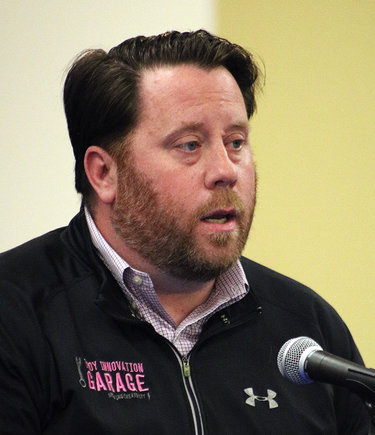Biz owner advises: Get rid of the playbook
ALBANY COUNTY — Tom Nardacci described with brutal candor the hardest three days of his life.
“I had to furlough about $300,000 of payroll … I thought about it. I thought about it. I couldn’t sleep. I couldn’t sleep. I was tortured,” he said.
In 20 years of business, Nardacci said, “I had never laid anyone off.” But then the coronavirus pandemic hit along with the restriction to prevent its spread.
Nardacci had earned a bachelor’s degree in history in 1996 at Syracuse University and a master’s degree in strategic communications from Columbia University in 2005, the same year he founded Gramercy, a public-relations firm based in Troy.
Then, in 2016, he founded Aurelius Coworks, which develops, owns, and operates coworking and incubator communities, including the Bull Moose Club in Albany and Troy Innovation Garage.
On April 22, Nardacci hosted an online forum about the outfall from the pandemic that attracted 24 speakers and 360 listeners at its peak, lasting two-and-a-half hours. The speakers included Albany County Executive Daniel McCoy and leaders from the county legislature, the Capital District Transportation Authority, local schools, and banks and other area businesses, he said.
McCoy invited Nardacci to speak at his Sunday press briefing, introducing him as someone who can “always re-invent his businesses and himself.”
“The story of small business will play out over the next six, 12, 18 months,” said Nardacci. “There’s a lot of uncertainty right now in the world of small business.”
Nardacci’s Bull Moose Club and Troy Innovation Garage provide a place for start-ups, entrepreneurs, and freelancers who don’t want to work at home to work independently in a shared space where they can “have creative collisions,” he said.
“The ultimate challenge now is how do you keep people together at a time like this when we’re all forced to be isolated and remote,” he said. “First and foremost, we had to navigate this public-health challenge initially on our own.” While Nardacci said he was sad to have to shut the doors to his businesses, he was also relieved because those were decisions he said he didn’t think he was qualified to make.
Now he sees his role as keeping the 200 people representing 40 companies who had worked out of the Innovation Garage or the Bull Moose Club in touch with each other, as part of communities. This ranges from giving them public-health information to online “coffees and conversations.”
Nardacci said he has also helped them navigate applications for federal loans. For his coworking companies, he applied right way for the Small Business Administration Paycheck Protection Program through his local Pioneer Bank.
“We qualified. This past week, the money was transferred into our account,” Nardacci reported.
“On April 1, our coworking business took a 30-percent hit … so our revenues were down about 30 percent. I think the revenues will do down again in May and again in June and then as this goes on and on,” he said.
“The lucky side for us is we’re small enough, conservative enough in our approach to business, we had money and I think we’ll weather this …”
Nardacci then talked about his difficult decision to furlough workers. “It’s played out to be the smart choice,” he said, explaining that, while the federal paycheck program helps, “it’s not going to pay all your bills.”
He went on, “The hope for us is we’re going to bring people back as soon as possible.”
Nardacci then gave “a quick snapshot” of his other business, Gramercy, because, he said, “I think a lot of people went through what I went through.”
He explained, “For the public-relations business, I waited because I wasn’t sure we were going to take the revenue hit we were going to take with the real-estate business. In fact, the public-relations business has gotten more work as people are dealing with this crisis and need help. So I waited a couple of days.”
Those few days meant he lost out on federal funds.
On Wednesday, Nardacci said, he called a banker he had dealt with for nine years. “My banker said, ‘Unfortunately, we closed on Sunday.’”
The bank had gone live on Saturday, Nardacci said, and gotten 4,000 applications in a day so stopped on Sunday, knowing it would have trouble processing that many applications and also worried it “might not have enough money to actually satisfy all of them,” said Nardacci.
After the initial $342 billion in federal funding for the program quickly ran out, Congress approved another $310 billion for small businesses, to be distributed starting on April 27. Administered by the Small Business Administration, the program offers loans to companies with 500 workers or fewer. Loans become grants for businesses that keep their workers on their payrolls for the eight-week loan period.
In talking to people, Nardacci said, “I think a lot of small businesses are going through the same … so this new round starts tomorrow at 10:30 … People need to apply right away. They should be getting their documents together right now and they should be ready to apply tomorrow.”
On Monday, however, the application portal for the Paycheck Protection Program crashed just a few minutes after opening and did not function for much of the day. The Small Business Administration, which runs the program, said the response was slowed by unprecedented demand.
Nardacci went on at the press briefing, asking, “What’s the future hold?”
He said, “Even though we’re isolated and we’re challenged, we still have to preserve the social fabric of the Capital Region. People still need to be connected. We still need to talk through the challenges together. We can’t do this in isolation …
“We all know it’s going to hurt. We all know that it’s going to be sluggish coming out of this. I think that’s a reality we all have to face … It’s going to be a slow bring-back for twelve, 24 — some sectors, 36 — months …
“Forty to 50 percent of businesses, retail businesses may not reopen … That’s a sad and hard truth but also out of this, you’re going to have innovation, you’re going to have people who are doing things that they never thought they could do.”
He urged, “Get rid of the playbook … see how you can do something different.”
McCoy added that he had talked to business owners who have been part of the fabric of Albany County for generations and they are saying, “The math does not add up to reopening. It’s going to take too long to recover from what they’re losing these next couple of months.”
McCoy also said, for county government itself, “It’s going to take the county probably 10 years to get out of this.”



